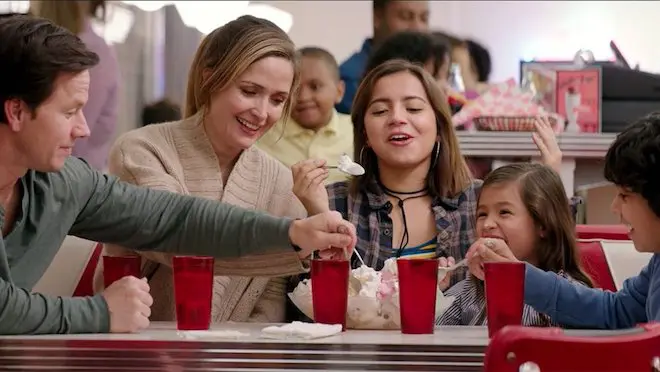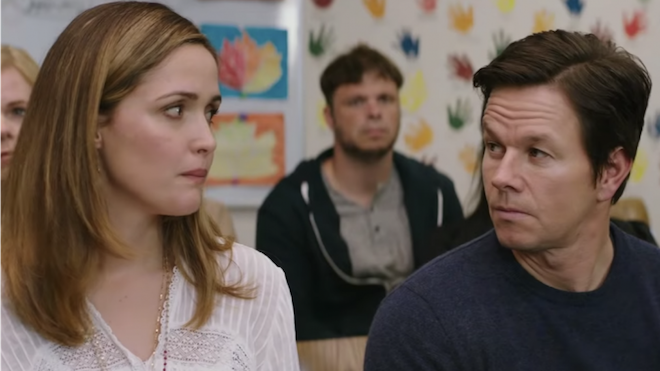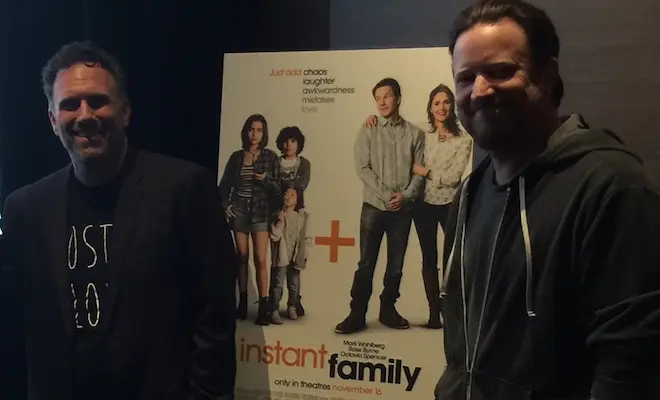Instant Family is a new family-friendly comedy starring Mark Wahlberg, Rose Byrne, and Isabela Moner, and the basis of the film comes from the true story of director and co-writer Sean Anders (Daddy’s Home, Hot Tub Time Machine). Anders and his wife, Beth, chose to adopt a foster child and ended up adopting three siblings, creating, you guessed it, an “Instant Family.”
We recently sat down with Anders and co-writer John Morris to talk about how the film came about, the importance — and stigmas — of fostering children, and more.
The foster care system is notorious for being full of kids who just need someone — anyone — to help them. Whether it’s issues at home or the birth parents’ inability to care for them for whatever reason, these kids are aging out of the system faster than they can be placed, and Sean Anders spoke a little about what good a movie like Instant Family can do for the cause.
“There are half a million kids in foster care right now, and of that half, give or take 100,000 kids, don’t have much hope of reunification,” Anders explained. “They are going to end up aging out of the system and those kids are kids like any other kids, they need love, they have love to give. That’s what I’m hoping will come out of the movie, with a better depiction of who these kids are. There have been great movies made about foster care, but they tend to reinforce these ideas people have — negative ideas about the kids in the system, I’m hoping by shedding a more positive light, it’s honest positivity, the stories of other people I’ve met, they’ve gone through some really rough times, they have really wonderful, heartfelt, sweet stories to tell. So yeah, my hope is to tell a more complete, give people a more complete picture of that.”
Since this movie obviously hit close to home for Anders and his wife, we asked if it was easier to find the story and situations — and comedy and emotions — in the truth of the matter with he and his Instant Family.
“It was easier and harder,” Anders admitted. “It was easier in the sense that I was my own expert and lived through it, it was very easy to talk to the actors and talk about those emotions and the things that happened along the way that were genuinely funny. And to know where that comedy comes from, because, again, my own story and the people that I met with to research the movie, there is so much laughter in these discussions, because everyone is dealing with the same things, and hopefully parenting and family issues, and even though every adoption story begins from a place of tragedy, when you’re building a family of any kind, there’s so much awkwardness and chaos, and things that lend themselves to comedy and humor,” he elaborated.
“So anyway, to answer your question, it was easier in that way, but it was harder because there was also more pressure on it to get it right and to make sure that these other families’ stories were represented as well, and to make sure that the proper reverence is paid to the people in the system. Like the social workers, for example, who tend to get a bad rap in the movies.”
Staying on the topic off fostering, we asked what was the process of writing a film like this, when the primary source is sleeping in a room down the hall.
“There was a long research process as well, we were meeting with social workers and other adoptive families,” Anders explained. “The movie is a fictional tale inspired by my own story, but also inspired by stories from other adoptive families we met along the way during the research process. So there was a lot of that. It was kind of the same process as Hot Tub Time Machine, just a really personal, well-researched kind of thing. I really wanted them to release Hot Tub Time Machine as “The Incredible True Story” but they wouldn’t do it.”
Co-writer John Morris offered his take as well.
“We spent two years writing it, so he had adopted the children and this was before we had even thought of making it into a movie,” Morris explained. “These stories about everyday things that were happening with the kids, how new it all was, and then when we sat down to write it, it was like ‘Oh, yeah, you told me this thing about when they were cutting strings and what that meant, and the story about the woman who stood up and said she wanted an African-American,’ and I thought that was funny and we just started rehashing all these things that had stuck with me that would make great scenes.”
The conversation then turned to the actual creation of Instant Family, the film, and how they were able to get Mark Wahlberg on board, not only as the star, but as executive producer.
“That’s a really good story,” Anders regaled. “I obviously know Mark from the Daddy’s Home movies, and Mark gets 15 offers a day, so you never know. This movie has a pretty different tone from what we’ve done in the past, so I wasn’t sure if he wanted to do it or not. I sent him an email really late into the night, rewriting it over and over, and the next morning I was driving my kids to flag football, we got there really early and were just sitting in a parking lot, and Mark calls. So I jump out of the car and he says, ‘Hey, I just want you to know I got your email and I just wanted to call you and say yes.'”
“That just doesn’t happen,” Anders admitted, “movie stars don’t call you and say yes, they say ‘that sounds like a really good project, let’s talk about it.’ He immediately started talking about kids he’s met over the years that are in care, he really liked my pitch on it and said, ‘yeah, I’m in.'”
“So I get back in the car, I’m so excited, and my kids asked, ‘what happened?’ and I said ‘Mark Wahlberg’s going to do the adoption movie,’ and they were like, ‘Yay…who’s Mark Wahlberg?’ I said ‘He’s Dusty from Daddy’s home,’ and they knew who he was, ‘We like Dusty.'”
“Then I called my wife. and she said ‘You know flag football is tomorrow?’ So I drove to an empty parking lot, got a ‘yes’ from Mark Wahlberg, and drove home.”
Rose Byrne stars as Ellie, the mother in Instant Family, and her entire motivation seems to be accepted as a mother. Byrne has done comedy in the past and she and Wahlberg work well together. We talked a little about that chemistry between the actors and what she brought to the project.
“Rose is very… she’s amazing,” Sean Anders proclaimed. “From the beginning, the first scene we shot is the one where Rose is looking at the kids on the website, proposing the idea to Mark. It was kind of an emotional scene, kind of a funny scene, a perfect first scene for us to shoot. When we were in the middle of our very first take, I could hear the crew whispering about how good Rose and Mark were together, everyone knew instantly they had really good chemistry.”
The familial unit in Instant Family in many ways represents the modern nuclear family. Was this intentional, or did they even know they were creating this road map for what a family looks like these days?
“I don’t think there is a modern nuclear family,” Anders said. “I think that’s kind of the point, family is changing in so many different ways. I can speak from my own experience that I met my kids in about the most random way possible, just a phone call saying ‘hey, come meet these three kids.’ Within weeks they were in my house and I was supposed to be their dad and they were supposed to be my kids. You would think that cannot be a recipe for love in a family, and I love my kids like crazy, and they’re such great kids and we have such a great time together.”
“So I feel whether it be someone coming in and having to be the step mom or step dad or a same sex couple adopting (Kind of addressed in Daddy’s Home 2, kind of our wheelhouse). I think that there is no specific way, particularly with so many kids who are growing up without families, without some of the basic things we all take for granted, I really hope more and more people explore this, because at least, in my opinion, it was a really wonderful way to start a family.”
There’s a scene in Instant Family where Lizzie (Isabela Moner) and Pete (Wahlberg) go off together so Pete can try to reach Lizzie on an emotional level. Peter restores and flips houses, so he takes her to a project site and they blow off some steam, which is the first time in the film that Pete connects with any of the kids, and it serves as almost the centerpiece of the film. We asked Sean about that scene and how it came about.
“I’ll tell you, the set up for it was, we had a social worker named Allison who we were getting information from,” he began, “and I had called her and wanted to talk about ways people might help kids in Lizzie’s situation; how to cope in that type of situation, and she started telling me about this kind of therapy where they just let kids break stuff, and I was like ‘Oh, man, I want to be a part of that!’”
“We already had this thread in the script about Pete and Ellie being house flippers, and demolition is kind of the most fun part. What we did, we built the kitchen and our special effects guys built in some resettable things that we could destroy two or three times, we’d have two or three cameras going, a lot of slow motion, and there’s a lot of over-the-top safety concerns that you have to address. It was a long day of breaking stuff. And Isabela who plays Lizzie, was a really having a good time just breaking stuff. I do remember it was the last day of shooting.”
Sean Anders has a history of writing and or directing R-rated films like Hot Tub Time Machine, Horrible Bosses 2, Sex Drive, and We’re The Millers, and his Daddy’s Home films are rated PG-13. Instant Family is probably the closest film he’s worked on that could be considered a true “family film.” Does he see a shift in his priorities in selecting projects now that he has a family?
“We don’t really think in terms of what the rating is with where we’re going,” he explained. “John and I both have families, our lives are kind of wrapped up in our kids and our day-to-day so I think those kind of stories interest us, when we get involved with rewrites in other types of movies, we always tend to find the father-son relationship or the daughter-mom relationship, whatever it is going forward.”
The idea that white, upper middle class families are saviors to foster kids in need hangs over Instant Family. In fact, the script mines these situations for laughs often, to varying results. Were they worried about creating a bigger social divide by making film about “white saviors”?
“In my personal story that came up, when you get involved with it, some people, we have the October (Iliza Schlesinger) character who is weirdly specific about what she wants. Some people come into the system specifically wanting a certain kind of kid, and there’s nothing healthy about that,” Anders said. “First of all, whatever child they want and what they get is different. Like having your own kids, if you want an athlete, he’s probably going to be a bookworm. In my case, we were just kind of open to wherever the need was, and we got a call from our social worker one day, saying there’s three kids we’d love you to meet. It would be disingenuous to say that you don’t have those thoughts ‘How will this look, how will people perceive this?’ on the outside. I wanted to touch on it in the movie.”
The character of October is one of our favorite parts of the film, which we shared with the filmmakers. Iliza Schlesinger does an amazing job with he performance. We asked the film makers how much of her character was written, and how much Iliza brought to the role.
“Iliza Schlesinger, I did not know her when she came in to read for us,” Anders explained. “Everyone that came in played October as insane, understandably, and we would give them the note, ‘could you try it like a CEO of a big firm,’ and then Eliza came in and without giving her the note she played it in a stern, strict crazy way and it was funny, I found out after that she’s a huge stand-up on Netflix, I wasn’t aware of that and now I’ve seen all her specials. I’m really glad you like October.”
The conversation then shifted back to the subject of foster kids and adoption, and how they could tell a story about such an important subject and still remain funny and lighthearted.
“Well, John from the very beginning was always stalking to me about where that line is,” Anders explained. “Kind of finding that sweet spot. We touched on the idea early of it being a comedy. Because A: so many of the stories I had told John were funny, and B: like I said before, we felt like so many movies made on this topic tend to be these gut-wrenching dramas that frighten people, and the truth is people are frightened enough about kids in the foster system and we didn’t want to contribute to that. Also, like I said before, every adoption is born out of some level of tragedy, there is real tragedy, real trauma, real difficult times, and we didn’t want to shy away from that, but we wanted a complete story of some of the real things Pete and Ellie confront and that the kids are dealing with, but taking it through where they become a family. When that happened with my own family it was a real — the ability to actually get to fall in love with your kids is a wonderful, amazing, joyous thing.
As we wrapped up, I asked John Morris specifically if working on this film changed his mind about fostering or adopting, and if they thought Instant Family would be a good advertisement for fostering for families wondering if they could do it.
“You’ve adopted, what, 26 kids now?” Morris joked to Anders. “I have a teenager and I thought of giving him up for adoption. It was funny, when he brought it up, even before we started the process, I told him I have two boys already.
“Kids are kids, mine are loud and sticky and they’re going to break your shit. If you can deal with that, you can have kids.”
“One of the nice things about making this movie,” Sean Anders said, “one of things that made it easy is that stuff is absolutely real, it wasn’t injected into the movie to give it a certain patina, when I took the adoption class we had same sex couples in there, we had people who found it through their church, we had single parents who wanted to adopt, we had a little bit of everyone. The October character that John had mentioned before, there was a woman in my class who was a little insane. Since I’ve talked to different people who have adopted through foster care, they all seem to have that sort of one person in their orientation who everyone would say ‘hmmm, I’m not sure if that person should have a kid.’
“So there’s a little bit of everyone, but the system and the calling kind of brings everyone together. What I loved, and what we tried to bring across in the movie, that you start off so different, but everyone has the same goal, which is to provide love and family to some kids, there’s not much of a better goal than that. As everyone moves through the process from the classes to the support group, there’s a lot of camaraderie and a lot of support from everyone, regardless of how different everyone is when they are coming in. That stuff is absolutely true.”
Instant Family is in theaters now and if you want more information about fostering kids or adoption, we implore you to check out Foster Parents, and for information on adopting, check out Adopt US Kids. You just might change the life of a child or children who need it.







